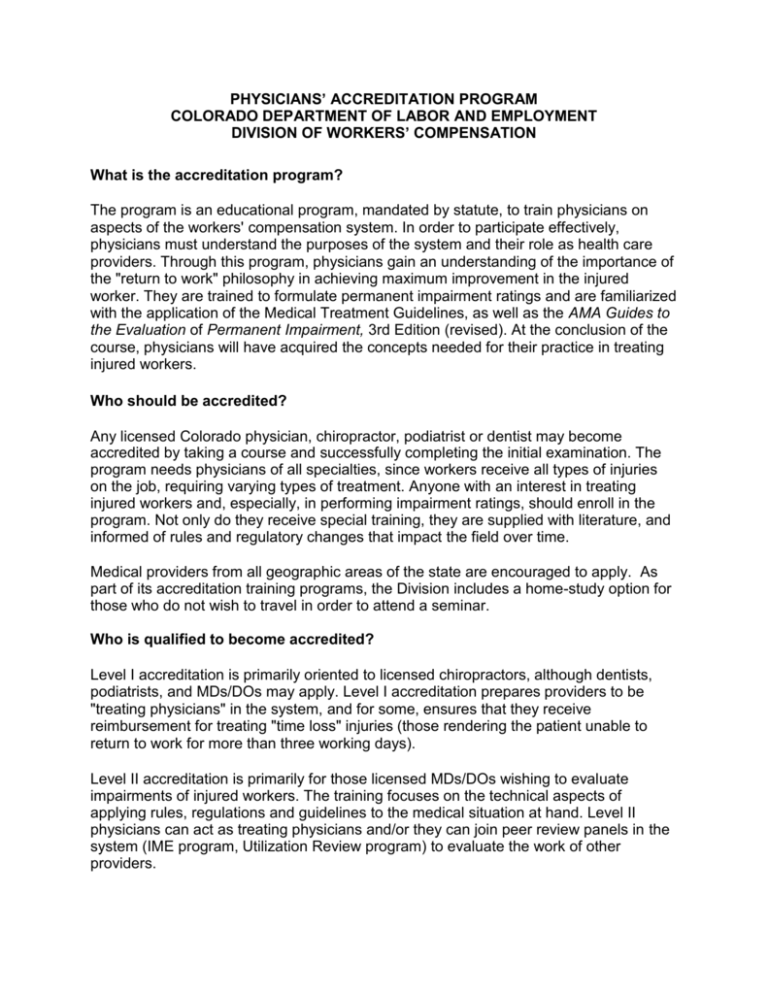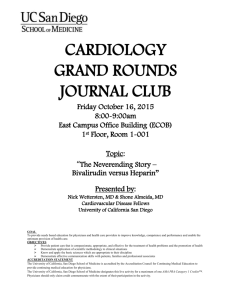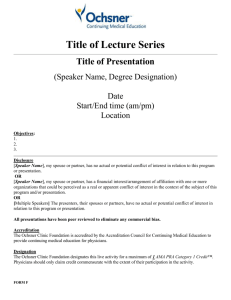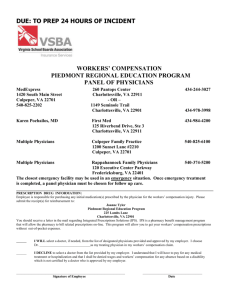physicians` accreditation program - Colorado Department of Labor
advertisement

PHYSICIANS’ ACCREDITATION PROGRAM COLORADO DEPARTMENT OF LABOR AND EMPLOYMENT DIVISION OF WORKERS’ COMPENSATION What is the accreditation program? The program is an educational program, mandated by statute, to train physicians on aspects of the workers' compensation system. In order to participate effectively, physicians must understand the purposes of the system and their role as health care providers. Through this program, physicians gain an understanding of the importance of the "return to work" philosophy in achieving maximum improvement in the injured worker. They are trained to formulate permanent impairment ratings and are familiarized with the application of the Medical Treatment Guidelines, as well as the AMA Guides to the Evaluation of Permanent Impairment, 3rd Edition (revised). At the conclusion of the course, physicians will have acquired the concepts needed for their practice in treating injured workers. Who should be accredited? Any licensed Colorado physician, chiropractor, podiatrist or dentist may become accredited by taking a course and successfully completing the initial examination. The program needs physicians of all specialties, since workers receive all types of injuries on the job, requiring varying types of treatment. Anyone with an interest in treating injured workers and, especially, in performing impairment ratings, should enroll in the program. Not only do they receive special training, they are supplied with literature, and informed of rules and regulatory changes that impact the field over time. Medical providers from all geographic areas of the state are encouraged to apply. As part of its accreditation training programs, the Division includes a home-study option for those who do not wish to travel in order to attend a seminar. Who is qualified to become accredited? Level I accreditation is primarily oriented to licensed chiropractors, although dentists, podiatrists, and MDs/DOs may apply. Level I accreditation prepares providers to be "treating physicians" in the system, and for some, ensures that they receive reimbursement for treating "time loss" injuries (those rendering the patient unable to return to work for more than three working days). Level II accreditation is primarily for those licensed MDs/DOs wishing to evaluate impairments of injured workers. The training focuses on the technical aspects of applying rules, regulations and guidelines to the medical situation at hand. Level II physicians can act as treating physicians and/or they can join peer review panels in the system (IME program, Utilization Review program) to evaluate the work of other providers. What are the benefits of becoming accredited? Chiropractors who become level I accredited are then assured that they may receive compensation for treating workers' compensation patients beyond ninety days after the first treatment, or in excess of twelve treatments, whichever occurs first (provided there is continuing medical necessity). Also, chiropractors, podiatrists and dentists may find Level I Accreditation useful for expanding their practice and/or enhancing their ability to “partner” with medical providers or networks. Although most M.D.s and D.O.s pursue Level II Accreditation, Level I provides support to physicians and valuable information about working within the workers’ compensation system for those who prefer not to perform impairment ratings yet have a practice in which they often treat injured workers. Navigating through the workers’ comp system can be challenging at times for all parties; Level I accreditation assists the physician, chiropractor, dentist or podiatrist with understanding and meeting especially the medical/legal demands of the system. Physicians may find it convenient to become Level II accredited, since some managed care companies are using the Level II certificate as a credentialing criteria when inviting physicians into their network. There is a suggestion that some managed care companies or networks may begin to require Level I accreditation of MDs/DOs who wish only to treat injured workers (and not render impairment ratings), although this is currently not widespread. Also, becoming accredited and participating in the workers’ compensation system provides opportunities to keep abreast of current trends in occupational medicine and to informally network with other providers that treat injured workers. The Division’s Independent Medical Examinations program, which exclusively uses Level II physicians, especially gives doctors the opportunity to learn about their peers’ practice in workers’ compensation. What if I don't want to treat any type of injury except, for example, orthopedics? A physician who is fully-accredited is certified to assess impairment for any body part or condition. However, the program allows physicians who practice in certain specialties to limit their accreditation. Examples of such limited accreditation include orthopedics, pulmonalogy, and psychiatry. The provider that chooses to limit his accreditation indicates that fact on his registration material. He will then be instructed on which workshops he must attend or which course materials he must study, and which test questions he must answer in order to successfully complete the exam. Upon completion, he will be listed on the state accreditation list as an accredited doctor with a limited field of designation. (For example, an ophthalmologist’s accreditation may limit him/her to render impairment ratings only for injuries to the eye.) Can I render impairment ratings if I am not accredited? No. Colorado law requires that only licensed physicians with Level II accreditation may provide impairment ratings of injured workers. C.R.S. 8-42-101 (3.6)(b). This includes only licensed medical doctors and doctors of osteopathy. Although professionals with other degrees may be involved in the treatment of or the assessment process with patients, (e.g., a licensed psychologist) they may not render final impairment evaluations. Is there professional support for physicians in the program? Yes. The Division provides participants with a curriculum, the medical treatment guidelines and a copy of the AMA Guides, 3rd Edition (revised), all of which are useful and necessary in determining medical and impairment outcomes in workers' compensation cases. In addition, the Division contracts with a licensed physician as its Medical Director. The Medical Director must have experience in occupational medicine, and advises the Division on issues of accreditation, impairment rating guidelines, medical treatment guidelines, and case management. The Medical Director is also available to consult with medical providers who have questions or problems relating to subjects under the accreditation "umbrella." The Division also employs a consultant that assists accredited physicians who may have questions involving application or understanding of the rules or impairment guidelines, and who also reviews medical reports submitted in connection with the Division’s IME program. The tutor is available on appointment to consult with any provider requesting such assistance. Finally, the Medical Policy Unit of the Division has specialists available to assist providers with questions about billing, the medical fee schedule, and application of the medical treatment guidelines. How do I begin the process to become accredited? To seek Level I or Level II accreditation, you must contact the Physicians' Accreditation Program (303-318-8763) and request a registration form. The form will be sent to you with instructions on how to proceed. The cost for the Level I accreditation course and exam is $200.00. Initial Level II accreditation costs $400.00. There is also a fee for renewing accreditation after the initial three-year period is completed ($150.00 and $400.00 for Level I and Level II, respectively). The Division offers accreditation seminars several times a year, and includes a home-study option. The cost and study materials are the same, regardless of the method of study. COLORADO DEPARTMENT OF LABOR AND EMPLOYMENT DIVISION OF WORKERS’ COMPENSATION General Q&A for Physicians: What is Workers’ Compensation and how can physicians participate? As early as 1915, the Colorado legislature determined that there needed to be a governmental system in place that would afford workers some relief when they were injured on the job. Lawsuits to establish liability and apportion costs between workers and employers were an expensive and inefficient solution to this problem. The workers' compensation system was developed as a "no fault insurance" system, eliminating the need for such litigation. The General Assembly developed the system to provide for medical and disability benefits for injured workers in these situations at a reasonable cost to employers. The system was intended to balance the needs and rights of all parties while reducing judicial intervention. Colorado Division of Workers’ Compensation The workers' compensation system in Colorado is administered by the Division of Workers' Compensation. This Division is part of the Colorado Department of Labor and Employment. The overall responsibilities of the Division include claims processing, education, records maintenance, insurance and employer compliance, premium and medical cost containment, medical services delivery, and dispute resolution. In Colorado, employers are required to have workers' compensation insurance, with some exceptions for specifically excluded occupations and individuals. Employers purchase insurance coverage through private carriers, or they are self-insured. Physicians participate in the system by treating injured patients, by reviewing the treatment provided to injured workers by other physicians, or by providing independent evaluations regarding injuries and/or treatment. The Division administers a training or “accreditation” program for physicians wishing to become involved in determining impairment ratings for injured workers. It also manages various programs where the physician performs a special type of peer review in workers' compensation cases. Overall, physicians must develop special knowledge and expertise to participate in the system. The medical and administrative rules and procedures that apply to these programs are developed and maintained by the Division. By statutory requirement, the Division maintains a medical fee schedule which sets the maximum fees that providers may be reimbursed while providing services to workers’ comp patients. Using both staff resources and representative medical providers from the workers’ comp community, the Division also creates evidence-based and consensus-based medical treatment guidelines. Division Oversight and Related Medical Programs Injured workers may receive injuries that readily heal and result in no long term problems, or the injury may have resulted in a permanent change which affects one’s ability to perform work duties or other activities of daily living. If permanent damage occurs, the injured worker is deemed within the system to have an "impairment." Impairment in the form of a percentage or a “rating” is assessed by Level II-accredited physicians, and the Division provides the Level II training. The legislature created certain programs to educate physicians about their roles and duties within the workers’ compensation system, and address disputes between the parties over treatment rendered to injured workers and impairment determinations reached by physicians. Also, legislative programs were created to set fees for medical services and to write treatment guidelines for high-frequency work-related injuries and illnesses. Medical Services Delivery Section (Accreditation and IME Programs) Physician's Accreditation Program This program was established in 1991 to educate physicians about participation in the workers' compensation system. Both the Level I and Level II Accreditation Programs address the medical, administrative and legal aspects of the workers’ compensation system especially as they impact and involve medical providers. The Level II program teaches physicians how to formulate impairment ratings utilizing the AMA Guides, 3rd edition (revised). Accreditation is available to every licensed physician with consideration of specialty and geographic area. Independent Medical Examination Program (IME) This program provides an independent review of workers’ compensation cases in which a date of maximum medical improvement and an impairment rating have been rendered by the treating physician. Where the worker and employer or insurer disagree about the physician’s conclusions, they may seek review of those issues in this program. Program physicians review the medical history, examine the patient and render impartial opinions on these issues. Because impairment ratings are involved, only Level II-accredited physicians may participate on the IME panel of physicians. MEDICAL UTILIZATION REVIEW PROGRAM This program provides for peer review of a treating physician's case in order to determine whether or not the medical services that were provided were reasonable, necessary and appropriate. A panel of experts is convened by the Division to conduct a “paper” review of the case and evaluate the health care services provided. The outcome of such proceedings may require a change of provider in that case, retroactive denial of fees, and/or revocation of accreditation. Medical providers of any specialty or discipline may participate on UR committees. MEDICAL POLICY UNIT The Medical Policy Unit works to ensure quality health care to injured workers while controlling medical and disability costs to employers. Its oversight includes the following programs: Medical Fee Schedule The Division is required by statute to establish fees for the medical services provided to injured workers. This program develops and updates a medical fee schedule in consultation with insurers, business representatives, the medical community, and other workers’ compensation service providers. Medical Treatment Guidelines This program is charged with developing and updating treatment guidelines which address the most frequent or most costly work-related injuries and conditions. There are currently 10 guidelines. The guidelines are developed in consultation with the Division’s Medical Director, medical researcher, and multidisciplinary medical task force members. Utilization and Billing Standards The program clarifies Division policies and procedures concerning health care billing and utilization. It facilitates dialogue between insurers and medical providers regarding billing disputes, and provides guidance to insurers and medical providers regarding billing and payment procedures, medical reporting requirements, prior authorization requirements, and other processes such as handling referrals to out-of-state providers.








